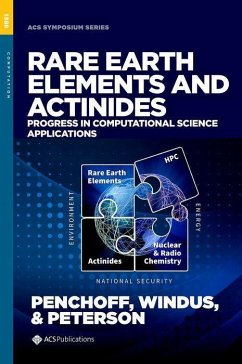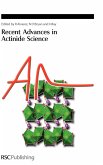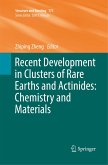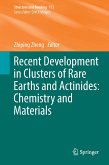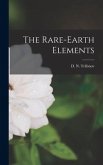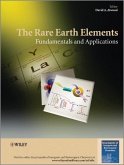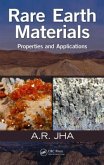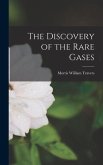Rare Earth Elements and Actinides: Progress in Computational Science Applications
Herausgeber: Penchoff, Deborah A.; Peterson, Charles C.; Windus, Theresa L.
Schade – dieser Artikel ist leider ausverkauft. Sobald wir wissen, ob und wann der Artikel wieder verfügbar ist, informieren wir Sie an dieser Stelle.
Rare Earth Elements and Actinides: Progress in Computational Science Applications
Herausgeber: Penchoff, Deborah A.; Peterson, Charles C.; Windus, Theresa L.
- Gebundenes Buch
- Merkliste
- Auf die Merkliste
- Bewerten Bewerten
- Teilen
- Produkt teilen
- Produkterinnerung
- Produkterinnerung
This work highlights recent advances in the study of rare earth elements and actinides, both of which are critical to nuclear waste challenges, through molecular and data drive modeling.
Andere Kunden interessierten sich auch für
![Recent Advances in Actinide Science Recent Advances in Actinide Science]() Recent Advances in Actinide Science168,99 €
Recent Advances in Actinide Science168,99 €![Recent Development in Clusters of Rare Earths and Actinides: Chemistry and Materials Recent Development in Clusters of Rare Earths and Actinides: Chemistry and Materials]() Recent Development in Clusters of Rare Earths and Actinides: Chemistry and Materials147,99 €
Recent Development in Clusters of Rare Earths and Actinides: Chemistry and Materials147,99 €![Recent Development in Clusters of Rare Earths and Actinides: Chemistry and Materials Recent Development in Clusters of Rare Earths and Actinides: Chemistry and Materials]() Recent Development in Clusters of Rare Earths and Actinides: Chemistry and Materials147,99 €
Recent Development in Clusters of Rare Earths and Actinides: Chemistry and Materials147,99 €![The Rare-earth Elements The Rare-earth Elements]() The Rare-earth Elements34,99 €
The Rare-earth Elements34,99 €![The Rare Earth Elements The Rare Earth Elements]() The Rare Earth Elements264,99 €
The Rare Earth Elements264,99 €![Rare Earth Materials Rare Earth Materials]() A R JhaRare Earth Materials211,99 €
A R JhaRare Earth Materials211,99 €![The Discovery of the Rare Gases The Discovery of the Rare Gases]() Morris William TraversThe Discovery of the Rare Gases33,99 €
Morris William TraversThe Discovery of the Rare Gases33,99 €-
-
This work highlights recent advances in the study of rare earth elements and actinides, both of which are critical to nuclear waste challenges, through molecular and data drive modeling.
Produktdetails
- Produktdetails
- ACS Symposium
- Verlag: Oxford University Press, USA
- Seitenzahl: 408
- Erscheinungstermin: 20. September 2022
- Englisch
- Abmessung: 257mm x 184mm x 30mm
- Gewicht: 1134g
- ISBN-13: 9780841298255
- ISBN-10: 0841298254
- Artikelnr.: 65693552
- ACS Symposium
- Verlag: Oxford University Press, USA
- Seitenzahl: 408
- Erscheinungstermin: 20. September 2022
- Englisch
- Abmessung: 257mm x 184mm x 30mm
- Gewicht: 1134g
- ISBN-13: 9780841298255
- ISBN-10: 0841298254
- Artikelnr.: 65693552
Dr. Deborah Penchoff is the Associate Director of the Innovative Computing Laboratory (ICL) at the University of Tennessee (UTK) and holds a faculty appointment in the UTK Department of Nuclear Engineering. She is a fellow of the Howard H. Baker Jr. Center for Public Policy and a cochair of the Diversity, Equity, and Inclusion Action Committee (DEIAC) in the UTK Department of Nuclear Engineering. Prior to these roles, she was a scientist at the Radiochemistry Center of Excellence and at the Institute for Nuclear Security, where she directed and managed the Scientific Fellows Program. She in an expert in applying high-performance computing (HPC) and data science for national security applications with focus on bonding and reactivity of Rare Earth Elements (REEs) and actinides. Her research focuses on computational science, including development of protocols for efficient utilization of HPC resources, data science, data analytics, machine learning, and molecular computational modeling. These have been applied across a wide range of interdisciplinary research fields, such as critical materials and shortage of REEs, radiotherapy for cancer treatment, predictive capabilities for epidemiology, selective separations, sequestration of uranium from seawater, radiochemistry, nuclear forensics, and nuclear waste. Dr. Penchoff obtained a PhD in Physical Chemistry with an Interdisciplinary Graduate Minor in Computational Sciences (IGMCS) at UTK while pursuing her research at the Oak Ridge National Laboratory and UTK Joint Institute for Computational Sciences (JICS). Dr. Penchoff is the chair of the Computational Science Applications for REEs and Actinides session and chair of the Data Science and Artificial Intelligence in Nuclear and Radiochemistry session in the American Chemical Society (ACS) Division of Nuclear Chemistry and Technology (ACS-NUCL). She is also the newly Elected Member-at-Large of the ACS-NUCL Executive Committee. Dr. Penchoff is also an XSEDE Campus Champion and a co-organizer of the Radiobioassay and Radiochemical Measurements Conference. While at UTK, Dr. Penchoff has been the recipient of multiple awards including a Faculty Service Award in the Department of Nuclear Engineering, an Outstanding Teaching Award from the ACS Student Affiliates, and an Outstanding Teaching Award from the Department of Chemistry. Prior to her career in science, Dr. Penchoff was a financial analyst at IBM. Dr. Theresa Windus is a Distinguished Professor and Liberal Arts and Sciences Dean's Professor in the Department of Chemistry at Iowa State University and a scientist at the Department of Energy's Ames Laboratory where she is a member of the Critical Materials Institute. She is also a Co-Director and Deputy Director for the Molecular Sciences Software Institute (MolSSI), the Director for the DOE NWChemEx Exascale Computing Project, and a former Co-Chair for the DOE Review of Exascale Computational and Data Requirements for Basic Energy Sciences. Prior to her position at Iowa State University, Dr. Windus was a Senior Scientist and Technical Group Lead at Pacific Northwest National Laboratory (PNNL) where she led a multidisciplinary team focusing on enabling computational resources for users at PNNL. There she also served as the technical group lead for the Molecular Sciences Software Group and led the development of NWChem - a leading worldwide software. Dr. Windus' current research interests are rare earth and heavy element chemistry, catalysis, aerosol formation, cellulose degradation, photochemistry, and design and development of efficient and novel massively parallel chemistry algorithms. She is an elected Councilor for the PHYS division of the American Chemical Society (ACS), serves on the Chemists with Disabilities Committee (ACS), is a Fellow of the ACS and of the American Association for the Advancement of Science, and has won multiple awards for her teaching and research. Dr. Charles Peterson is a scientist and HPC administrator at the Office of Advance Research Computing at the University of California, Los Angeles (UCLA). In this role, he enables computational research through consulting and collaboration in addition to training faculty, staff, and students to utilize UCLA's advance computing capabilities. Dr. Peterson is also an interdisciplinary researcher, collaborator and information technology professional with expertise in scientific computing and computational research applications across physics, chemistry, and material science. Prior to his work at UCLA, Dr. Peterson was instrumental in creating an advanced high-performance computing (HPC) network that enhanced research for many scientific groups at the North Texas Scientific Computing Center located at the University of North Texas (UNT). He is an active researcher in the development of computational methods for modeling and simulation of chemical properties of lanthanide and actinide containing compounds. His collaborations with the Institute for Nuclear Security and the Howard H. Baker Jr. Center for Public Policy led to research development in thermochemical and spectroscopic properties of heavy element systems for nuclear forensics, separation chemistry, and other applications in national security.

